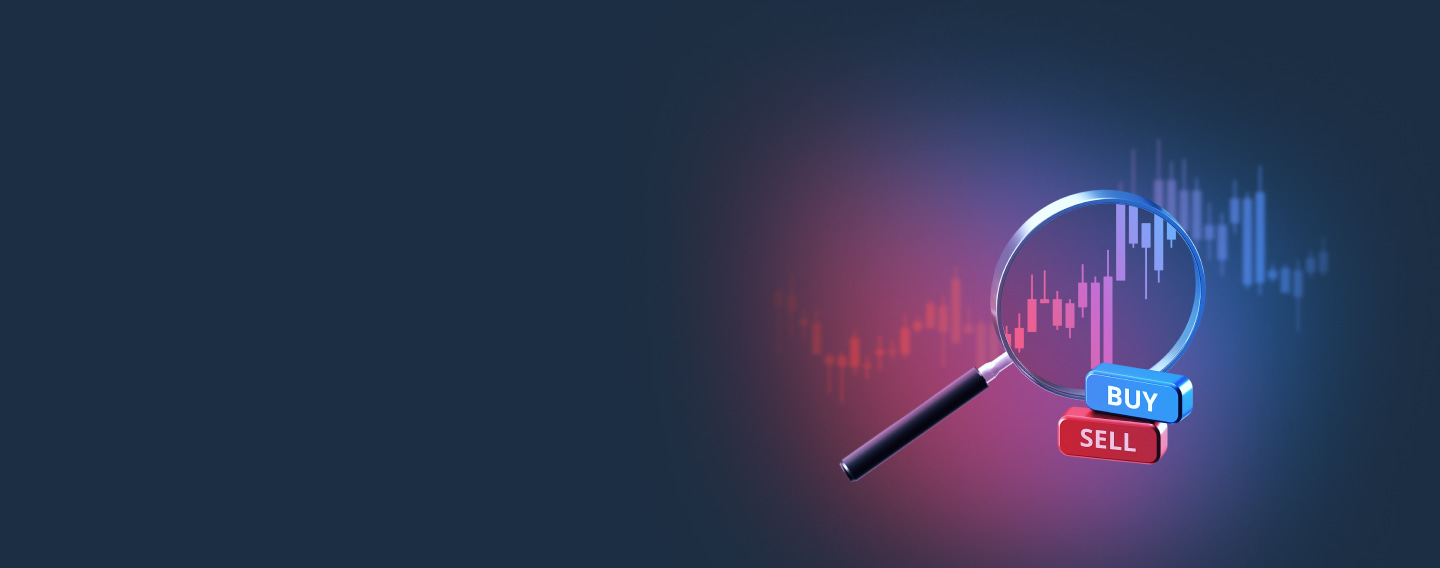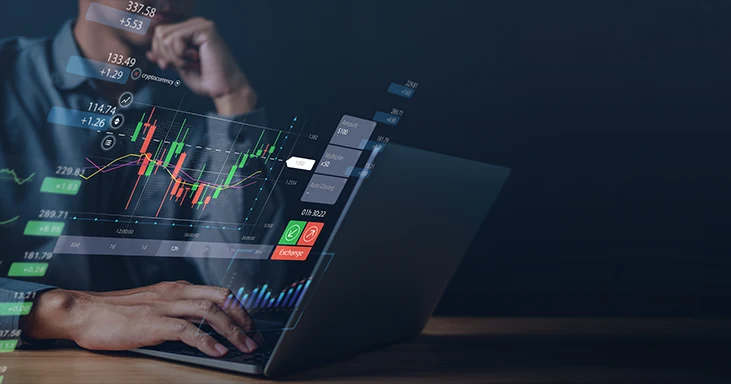


What is Trading? - A complete beginners Guide
Forex Fundamentals
Introduction to Trading
Understanding the Basics of Trading
Trading—buying and selling in the financial markets—is a modern phenomenon and a fundamental economic activity that has evolved over centuries. At its core, trading involves the exchange of commodities, stocks, forex, and cryptocurrencies, aiming to profit from fluctuations in market prices. Unlike investing, which often focuses on long-term growth, trading capitalizes on short-term market movements.
The digital era has revolutionized trading, making online platforms and mobile apps, such as those offered by HYCM, indispensable tools for traders. With these platforms, accessing global markets has never been easier, allowing traders to engage with the stock market, forex market, and even the volatile cryptocurrency trading sphere from anywhere, at any time.
The key to successful trading is predicting market trends and understanding risk management and strategies. Whether one opts for day trading, swing trading, or position trading, the goal remains the same—maximizing gains while minimizing losses. Embracing the right trading plan, backed by technical analysis and a clear understanding of market dynamics, can turn trading from a daunting challenge into an exciting opportunity to grow one's financial portfolio.
The trading world opens up a vast playground for those exploring the financial markets. At its heart, trading involves the swift exchange of assets like stocks, forex, commodities, and cryptocurrencies, aiming to leverage short-term price movements for profit. Unlike the slower rhythm of investing, trading thrives on the pulse of market fluctuations, offering a dynamic arena for financial growth.
The Markets Beckon
In the tapestry of trading, each thread—stock market, forex market, commodities, and cryptocurrency trading—offers unique opportunities and risks. The stock market, with its shares of companies, presents a way to tap into corporate fortunes. Forex trading, on the other hand, involves currency pairs, offering a 24/5 window to the world's economic heartbeat. Commodities trading harks back to ancient markets, dealing in gold, oil, and grain, while cryptocurrency trading ushers in a digital frontier ripe with volatility and innovation.
Tools of the Trade
Success in trading hinges on what you trade and how you trade. Modern traders are armed with online trading platforms and mobile apps, like those provided by HYCM, which serve as gateways to global markets. These platforms offer real-time access to market data and tools for technical analysis, helping traders make informed decisions.
Strategy: The Compass for Trading
Navigating the trading landscape requires more than just a keen eye for market trends; it demands a strategy. Whether it's day trading, where the market's daily pulse dictates buy and sell decisions, or swing trading, which seeks to capture gains over several days, having a clear plan is paramount. Risk management becomes a linchpin in this strategy, ensuring that potential losses are kept in check and profits are pursued wisely.
In essence, trading is a journey through the ever-shifting sands of the financial markets. With the right tools, knowledge, and strategy, it transforms from a daunting challenge into an exhilarating opportunity to forge one's path to financial empowerment.
Different Styles of Trading
Exploring Trading Strategies
Trading isn't a one-size-fits-all journey. It adapts to your lifestyle, goals, and risk tolerance. Each style offers a unique path in the vast financial markets, from the fast-paced action of day trading to the calculated patience of position trading. Understanding these styles is crucial for navigating the trading landscape successfully.
Day Trading: The Sprinter's Path
Imagine the thrill of a sprinter—quick, agile, and focused. That's day trading, where traders buy and sell financial instruments on the same day. It's a strategy for those who crave immediacy, with trades wrapped up before the market's closing bell, avoiding overnight market volatility. Day traders live by the clock, seizing opportunities that last from seconds to hours.
Swing Trading: The Middle Ground
Swing trading is for those who like to ride the waves of market trends but at a more measured pace. It's about catching gains in stock prices over days to weeks, giving traders the time to make thoughtful decisions. Swing traders thrive on the rhythm of the market, using analysis to predict short-term movements and capitalize on them.
Position Trading: The Marathon Runner
Then there's position trading, akin to a marathon runner's long-distance journey. It's a strategy for the patient soul, holding onto securities for months to years, looking beyond the market's day-to-day fluctuations towards the bigger picture. Position traders are the visionaries, betting on a stock's long-term potential through in-depth market analysis and trends.
Each trading style requires unique skills and a deep understanding of market dynamics. Whether you're drawn to the quick strikes of day trading, the strategic positioning of swing trading, or the long haul of position trading, mastering your chosen style can pave the way to financial success.
Setting Up for Trading
Your Gateway to the Financial Markets
Setting up for trading is your first step into the exhilarating world of the financial markets. It's about laying the groundwork, choosing the right tools, and aligning your strategies with your financial goals. Think of it as setting sail on a vast ocean, with preparation being key to navigating the market's waves.
Choosing the Right Broker
The cornerstone of your trading setup is selecting a broker, like HYCM, that aligns with your trading needs. Look for a broker with a user-friendly online trading platform, comprehensive market access, and educational resources to sharpen your trading skills. It's not just about the fees or the spreads; it's about their reliability, customer support, and trading experience.
The Importance of a Trading Plan
With your account set up, drafting a robust trading plan is your next milestone. This plan should outline your trading style, risk tolerance, and financial goals. It's your trading blueprint, guiding every buy or sell decision with discipline and strategic foresight. Your trading plan keeps your journey focused and aligned with your long-term financial vision.
Starting your trading journey requires careful consideration and preparation. Choosing the right broker and crafting a detailed trading plan sets the stage for a rewarding trading experience. Let the markets be your playground, where strategy, timing, and a cool head prevail.
The Role of Emotions in Trading
Navigating Emotional Waters
The journey through the trading world is as much about managing emotions as it is about strategy. Emotions, if not kept in check, can turn the clear waters of trading into a turbulent sea. Fear and greed, the two most prominent emotions within the trading arena, often lead traders astray, pushing them to make impulsive decisions.
Mastering Emotional Discipline
Mastering emotional discipline sets successful traders apart. It involves recognizing emotional triggers and implementing strategies to maintain control. This could mean setting strict trading limits or stepping away to clear your mind after a loss. The key is to treat trading like a business, where decisions are based on logic and strategy rather than the highs and lows of emotional tides.
Trading isn't just about the numbers and charts; it's a psychological journey. Understanding and managing your emotions pave the way for a disciplined and successful trading experience. Remember, emotional control is your anchor in the vast ocean of trading.
Conclusion and Next Steps: Embarking on Your Trading Journey
As we wrap up our exploration of trading, remember that starting small and learning continuously are your best strategies for success. Trading is not just about making profits but cultivating discipline, patience, and resilience. Dive into the markets with a curious mind and a robust plan. Whether you're day trading, swing trading, or taking a position trading approach, each trade is a step towards mastering the art of trading. Consider platforms like HYCM to begin your journey, where resources and tools are designed to guide beginners. The path is set, and the tools are ready—your trading adventure begins now.
FAQs on What is Trading
What is the minimum amount needed to start trading?
You can start trading with HYCM for as low as $20, making it an accessible platform for beginners eager to enter the trading world without a significant initial investment. This low entry barrier opens the financial markets to a broader audience, offering an opportunity to learn and grow in the trading space with minimal starting capital.
How do day trading and swing trading differ?
Day trading and swing trading are two distinct styles based on the holding period of trades. Day trading involves buying and selling securities within the same day, with traders typically closing all positions before the market closes to avoid overnight risk. Swing trading involves holding positions for several days or weeks to capitalize on expected midterm market movements, offering a less intensive approach to market participation.
Can I trade with a mobile app?
Yes, you can trade with a mobile app, and platforms like HYCM offer user-friendly mobile trading apps that bring convenience and flexibility to trading. HYCM's app allows traders to access financial markets, execute trades, manage their accounts, and analyze market trends directly from their mobile devices, ensuring they can trade anytime and anywhere, thus always taking advantage of every opportunity.



